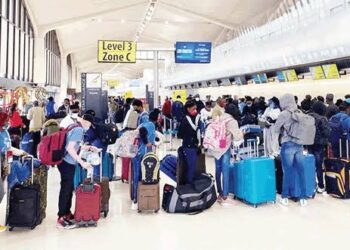A recent report by the UK Office for National Statistics (ONS) has raised concerns over the increasing number of Nigerian students opting to stay in the UK after completing their studies.
The data revealed that 76% of Nigerian nationals who entered the UK on study-related visas during the year ending June 2021 transitioned to non-study visas within three years, a significant rise from 24% in 2019.
Experts are now warning that this trend could have severe economic consequences for Nigeria.
Rising brain drain and talent loss
According to HR expert, Kehinde Akintobi, the growing number of Nigerian students choosing to remain abroad after completing their studies is a clear indication of an escalating brain drain.
“As talented individuals leave, they take with them critical skills that are essential to the development of the Nigerian economy,” Akintobi stated.
This migration of skilled labour is leading to what Akintobi calls a “capacity gap” in sectors vital to Nigeria’s growth and an increased cost of human resource because of the brain drain. He explained that many Nigerian businesses are now struggling to fill vacancies in these fields, which is driving up costs in recruitment and training.
“The loss of talent means the country faces a shortage of skilled professionals, which further hampers economic progress,” he said.
Financial strain on Nigeria’s economy
The report from the ONS has also drawn attention to the financial impact of this migration trend. According to Mr. Olumide Ohunayo, General Secretary of the Aviation Safety Round Table Initiative (ART), Nigeria is losing substantial financial resources through the outflow of students.
“People have invested significant amounts of money in educating students abroad, yet we are not seeing a return to the economy when they decide to stay there,” Ohunayo said.
He explained that the funds used to support students’ tuition and living expenses abroad have contributed to Nigeria’s foreign exchange outflows. With many students not returning to Nigeria after their studies, the country is effectively losing out on the potential economic contributions. “These funds have been spent but there’s no return. We’ve depleted our forex reserves, and we’re not seeing any investment come back into the country,” he stated.
Impact on Nigeria’s youth and socioeconomic stability
The growing trend of students staying abroad is also contributing to rising levels of youth disillusionment within Nigeria. Ohunayo warned that seeing peers leave and succeed in foreign countries is making younger Nigerians increasingly disillusioned about opportunities at home.
“When they see their peers leave to study abroad and not return, it encourages others to follow suit,” he said.
This sense of disillusionment is creating a cycle, where students continue to seek opportunities abroad, leaving Nigeria with a shrinking pool of skilled professionals. Additionally, families are selling assets and mobilizing funds to send their children abroad, which is placing further strain on the nation’s economy.
“People are mopping up funds for their kids and kins to travel, and in doing that, they are putting pressure and weakening the Naira,” Ohunayo added.
What needs to change for Nigeria to retain talent
Experts suggest that the Nigerian government must address the underlying causes of this migration trend in order to retain more of its educated youth. Akintobi emphasized that improving the country’s economic and social conditions would make Nigeria a more attractive destination for highly skilled professionals.
“The thing is when things are going well, everything will align. Money flows in a direction like water. If things are going well, people typically will come back. Just like you do not need anybody to tell you that Dubai is a good place to invest because you see it everywhere; from the airport to the town and all,” Akintobi said.
Ohunayo added that systemic changes are crucial to curbing the flow of talent abroad.
“For people to return, there needs to be a functional system in place—better security, improved justice, and a stable economy. Once people see that these systems are in place, they will be more inclined to stay,” he stated, stressing again how this troubling trend poses significant challenges for Nigeria’s economy.























